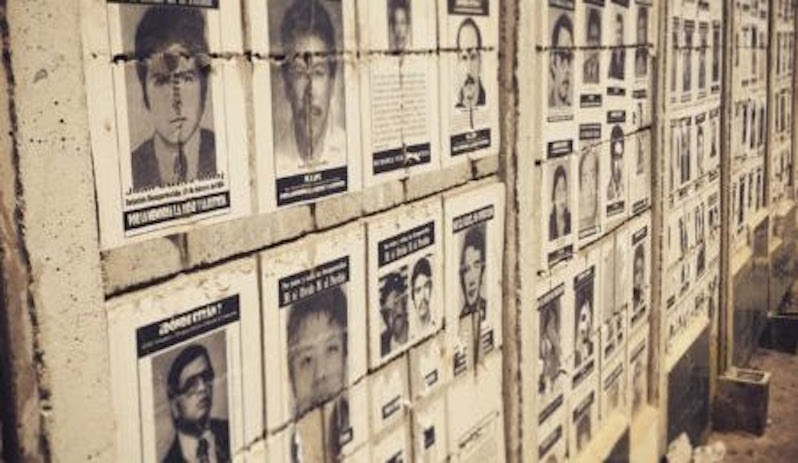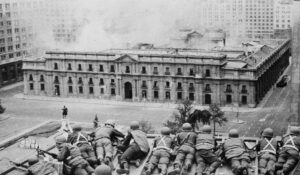A Search for Justice in ‘Finding Oscar’
The documentary traces the story of a 1982 massacre of a Guatemalan village to a trial three decades later, with human rights advocates as the heroes. "Finding Oscar" features personal stories from survivors of Guatemalan genocide in the 1980s. (FilmRise)
"Finding Oscar" features personal stories from survivors of Guatemalan genocide in the 1980s. (FilmRise)
“Finding Oscar” features personal stories from survivors of Guatemalan genocide in the 1980s. (FilmRise)
In the spring of 1954, CIA-backed forces staged a coup in Guatemala against the democratically elected President Jacobo Arbenz. In his place they installed Carlos Castillo Armas, the first in a series of military dictators who soon led the country into a 35-year civil war that claimed the lives of 200,000, 93 percent of them at the hands of U.S.-backed government forces. The new documentary “Finding Oscar,” in theaters now, looks at one incident in that decades-long struggle, the massacre of an entire village and the hunt for a survivor who could at long last help bring the butchers to justice.
During the early 1980s, Washington stood firmly behind Guatemala’s President Efrain Rios Montt, whom Reagan called “a man of great integrity” and “totally dedicated to democracy.” Yet in 2013, a Guatemalan court convicted Rios Montt of genocide and crimes against humanity. The ruling was overturned on appeal and the case is ongoing.
The case stemmed from an incident during Rios Montt’s presidency. After leftist guerillas successfully captured a cache of government rifles, the Kaibiles, notoriously brutal special-ops forces known for using massacre as a weapon, were sent to investigate. Dressed as rebels, they raided the isolated farming village of Dos Erres on Dec. 6, 1982, rounded up the residents and threw them into a well — some tortured and bloody, some unharmed, others with their heads smashed in, 40 families in all, including 67 children.
“Finding Oscar” follows human rights worker Aura Elena Farfan, among the first to hear of the disappearance of Dos Erres, and forensic anthropologist Fredy Peccerelli, who joined an exhumation in 1994, identifying victims and making sure next of kin were notified. Along with Attorney General Claudia Paz y Paz, rookie prosecutor Sara Romero built the case against her own government, enlisting the help of U.S. immigration agents who arrested war criminals hiding in this country.
In a Spielbergian twist, two small boys had escaped the 1982 massacre, Ramiro Cristales and Oscar Ramirez (the Oscar of the film’s title). Chosen for their lighter skin and eye color, they were spared and raised in separate homes by the same men who had slaughtered their families. When the movie catches up with Cristales, he is leading a middle-class life in Winnipeg, Manitoba. Ramirez works in a Mexican restaurant in Framingham, Mass. Both provided testimony that was instrumental in bringing to account some of the men responsible for the massacre.
“There can be justice, and we can shine the light on this so people realize what’s happening in the world and hopefully it won’t happen again,” Frank Marshall, producer of “Finding Oscar,” told Truthdig. His company, Kennedy/Marshall, produced the film, with frequent collaborator Steven Spielberg as executive producer.
“There’s this idea of ‘Never again,’ and of course it happens again and again and again, including a genocide in our own backyard in the Americas and in our lifetime,” director Ryan Suffern told Truthdig about the deliberate targeting of civilians. “What happened in Guatemala wasn’t unique to Guatemala. It’s happened throughout human history. It’s happened all around the world, regardless of ethnicity, regardless of skin color, religious beliefs.”
Suffern recalled interviewing two former Kaibiles, Fabio Pinzon Jerez and Cesar Ibanez, whom he had come to accept as evil incarnate. More chilling was the fact that they seemed rather average. “They’re human beings,” was his immediate conclusion about them. “Not to rationalize what they were involved with and the horrific acts that they themselves committed, but it immediately challenged those preconceptions of good and evil. So that was an education for me, having never really interacted with somebody who had been involved with such heinous crimes.”
“Finding Oscar” is a documentary with a Hollywood pedigree, featuring character arcs and plot twists crafted with an unapologetic nod to conventional rules of screenwriting. Hollywood movies set in Iraq and Afghanistan usually avoid the sticky politics of who invaded whom and why, instead narrowing the scope away from the moral implications of a wider context and focusing on one person’s struggle.
Likewise, “Finding Oscar” brushes over the fact that Reagan, still in his first term and struggling with an economic recession domestically, sought to show strength with a hard line on Central America. In the case of Guatemala, he circumvented the Carter administration ban on military aid, funneling money and weapons to dictators despite (or because of) the fact that they were guilty of war crimes.
“The Reagan administration, specifically, is culpable for supporting a dictatorship that was involved in acts of genocide. This one particular story showcases that we’ve been, as a country, on the wrong side of history in some of our foreign affairs,” Suffern said. International attention to the case and a louder cry for justice are attributed in part to homegrown media, mainly This American Life’s 2012 airing of “What Happened at Dos Erres,” and ProPublica’s extensive reporting.
“If there’s any redemptive arc in this story, I think it is the work these folks are doing in the human rights violator section within Immigration [and] Customs Enforcement to go find these perpetrators,” Suffern said. “The international pressure has changed the dynamic in Guatemala. I think our government has that same potential to do good and is trying to do good as we see in this story.”
Your support matters…Independent journalism is under threat and overshadowed by heavily funded mainstream media.
You can help level the playing field. Become a member.
Your tax-deductible contribution keeps us digging beneath the headlines to give you thought-provoking, investigative reporting and analysis that unearths what's really happening- without compromise.
Give today to support our courageous, independent journalists.





You need to be a supporter to comment.
There are currently no responses to this article.
Be the first to respond.